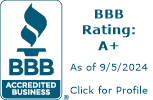As the height of hurricane season approaches, the likelihood of storm-induced power outages is at its peak. But then again, power outages can occur for many reasons other than seasonal storms. Before and after a power outage, you can count on the Gainesville restoration professionals with Maven Construction Group.
Before A Power Outage Occurs
Have A Plan
The best defense against a power outage is a plan. Sit down with family members and create plans for several hours, more than one day, and more than a week without power. Make a list of household devices that require electricity and determine what is necessary and what isn’t. Find a way to power necessary devices, such as oxygen tanks, with an alternative power source, like a portable power supply unit.
Fill Vehicles With Gas
Make sure all of your vehicles are filled with gas beforehand to avoid the headache of closed gas stations. Also, ensure you have gas for your generator and extra gas to refill the unit when the generator runs out. If Gainesville, FL, storm damage is widespread and severe, homes and businesses, including gas stations, may be without power — and unable to provide gasoline — for several days.
During A Power Outage
Use Generators Wisely
Portable generators are a staple for surviving power outages in Florida, but should be used wisely at all times. Read and follow the manufacturer’s instructions before turning on any generator and make sure to never operate a portable generator indoors. Generators, portable or permanent, emit carbon monoxide, which is a deadly colorless and odorless gas. Fans and open doors and windows can’t provide enough fresh air and air circulation to prevent a build-up of carbon monoxide.
Use Flashlights & Battery-Operated Lights
Candles are relatively inexpensive and readily available, but they create a major fire risk, especially during a power outage. Flashlights and battery-powered lights are safer alternatives. LED flashlights and lanterns use standard alkaline batteries but are more efficient than bulb-style counterparts. Make sure every room in the home has at least one light source.
How To Choose A Generator For Power Outages
Many people use generators to power appliances and other essentials during a power outage. But it’s not as simple as going to your local hardware store and buying a generator. Maven Construction Group, storm damage contractors in Gainesville, FL, share three things you should know about generators before the power goes out.
Permanent or Portable
Generators come in two styles, permanent and portable. Permanent generators, also called stationary generators, are installed in an outdoor location near the home and automatically begin supplying power when the main source is disconnected. Portable generators are more common because installation isn’t necessary and they are less expensive to purchase. Ultimately, choosing the best generator for your home depends on your household’s unique requirements.
Wattage Requirements
The size of a generator is based on wattage. The total wattage is an accumulation of the power required of each item you want to use during a power outage. It’s recommended to speak with an electrician to make sure a generator is capable of supplying enough power to appliances and systems without damaging either one. On average, the following appliances use at least 2,100 watts for start-up only, while running wattages tend to be slightly lower.
- Ceiling fan: 35 watts
- Laptop: 25 watts
- Microwave: 1500 watts
- Refrigerator: 225 watts
- Stereo system: 33 watts
- TV: 86 watts to 300 watts
Power Cords For Operation
Once you’ve selected an appropriately sized generator, you’ll need an all-weather rated extension cord to connect the generator to the transfer switch. There are other means of connecting a generator to a home’s power supply, but they are strongly discouraged for many safety reasons. A transfer switch connects to the circuits in the electrical panel, usually to circuits connected to appliances you’ll often need to use, such as ceiling fans and a refrigerator. It comes in two forms, manual and universal transfer switch (UTS). A manual transfer switch has a series of steps to complete before the generator is ready to use, while a UTS begins to work as soon as the generator starts.
Have A Storm-Ready Kit Year Round
Non-perishable food and potable water are two of the most important items to have on hand at all times. At the minimum, keep a three day supply of food and water in a kit. Generally, each person will need one gallon of water per day during an outage. Also, if you have pets, remember to have extra food and water ready for them. Periodically check expiration dates on all supplies, especially food items, and replace any expired items as necessary.
Basic Supplies
Store supplies in airtight containers and/or plastic bags to keep them dry. Essential basic supplies include:
- Battery-powered or hand crank radio;
- Extra batteries for flashlights and lights;
- Extra cell phone with chargers and backup batteries;
- Flashlights and/or battery-powered lights;
- First aid kit;
- Non-perishable food;
- Toolbox with pliers or wrench to turn off utilities; and
- Water.
Extra Supplies
- Books, puzzles, and other activities for kids;
- Clean clothes and shoes;
- Cash and/or traveler’s checks;
- Non-prescription and prescription medications;
- Personal documents, such as banking information, homeowners’ insurance, and passports; and
- Personal hygiene items including toothbrushes and toothpaste, shampoo, and hand soap.
Schedule Storm Damage Repair When Necessary
No matter how much wind and storm damage restoration cleanup your home or business needs after a storm, Maven Construction Group works quickly to help you return your life to normal. Our team follows a three-step process to ensure every building is secured, cleaned, and repaired or rebuilt. Day and night, we’re here for you — call Maven Construction Group today.


